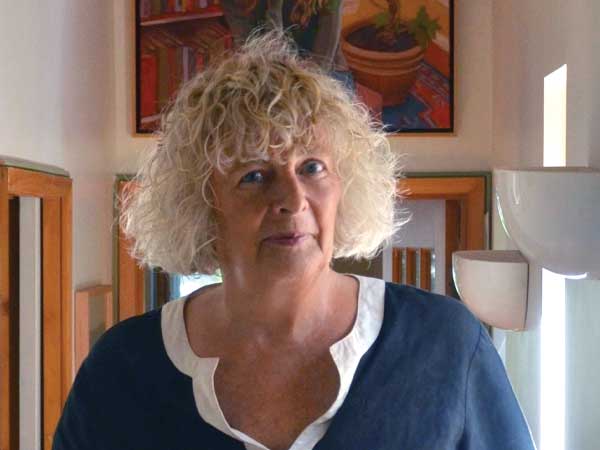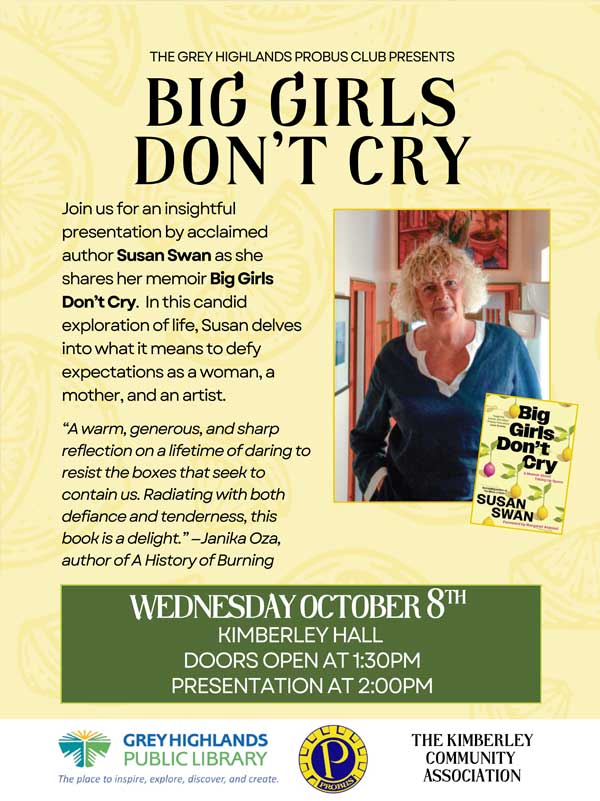in Chatsworth, Grey Highlands, Southgate, West Grey
September 30, 2025

Author and former performance artist Susan Swan knows a lot about space, literal and figurative, and how people fit into it — or don’t.
You’ll learn a lot about her often funny, always profound and meticulously written exploration of this theme — and other themes — on Wednesday October 8 at 2:00 pm at the Kimberley Community Hall, 235309 Grey Road 13, in the village of Kimberley (doors open at 1:30). This event is free and open to the public (no registration required.) It’s the latest in a popular lecture series sponsored as a public service by the Grey Highlands PROBUS Club in cooperation with the Kimberley Community Association and the Grey Highlands Public Library. Susan will delve into what it means to defy expectations as a woman, a mother and an artist, and she will talk about her latest book, the memoir Big Girls Don’t Cry — a book that one reviewer described as “a warm, generous, and sharp reflection on a lifetime of daring to resist the boxes that seek to contain us.” Susan’s talk will address the boxes that hold us back from being our best selves. Copies of Big Girls Don’t Cry will be available for purchase at the event.
Susan, a Toronto novelist and non-fiction writer, is a professor emerita at York University. Her fiction has been published in 20 countries and translated into ten languages, and in 2023, she received the Order of Canada for her writing, for its contribution to Canadian literature and for mentoring the next generation of Canadian writers. She also co-founded the Carol Shields Prize for Fiction, the largest literary prize in the world for Canadian and American women and non-binary fiction authors. Susan has also served as chair of the Writers' Union of Canada.
Her memoir, Big Girls Don’t Cry, is about the way her size (she is six feet two inches tall) shaped her life. It was published simultaneously by HarperCollins Canada and by Beacon Press in the US in 2025 — and it’s on the Canadian Indie Bestseller list. She’s now working on a sequel to her short story collection, Stupid Boys Are Good to Relax With.
Raised in a book-filled home in Midland, Susan’s writing career was nurtured by her mother, a homemaker whose own aspirations to be a writer were stymied by her fears that she wouldn’t be able to write well. But she infused her daughter with the belief that writers are important people with important things to say. Even as a child, Susan wrote stories and told them to family and friends, and envisioned a future for herself as a fiction writer.
Susan’s own writing aspirations were fostered in early adulthood by a course given by Canadian writer Hugh MacLennan. He had an interest in physiognomy — the study of faces — and he felt Susan had the right chin to be a writer. He instilled a sense of respect for the ambition and craft of writing in his students and he strengthened Susan’s confidence, but she was not good at sharing her work fully with him — a fear of being judged still inhibited her. She was then taught at McGill by writer Constance Beresford-Howe, who wrote ten novels — all about women seeking identity and independence. Beresford-Howe became Susan’s mentor. Like MacLennan, she was fair-minded and saw and nurtured Susan’s talent. “Constance was a literary mother figure for me, just as Hugh was my father figure,” says Susan. Writers Marian Engel and Margaret Attwood also encouraged Susan during her formative writing years.
To make money, Susan’s first forays into professional writing came through journalism. She wrote for the McGill Daily, the Midland Free Press and the Toronto Telegram — all the while knowing that fiction was her future.
Susan says the position of women writers has improved over the years, but there are still impediments. Women are often expected to write commercially-oriented “happy ending” fiction, yet Susan most admires those women writers who take risks in terms of both the form and content of their work.
Another enduring obstacle is the tendency for publishers to pay higher advances to male writers and for critics talking about great literary books to think mostly of men who write.
In part to address these obstacles, Susan co-founded the Carol Shields Prize for Fiction in 2013 at a time when women writers were given only a third of the literary prizes and a third of the book coverage in both Canada and the US. It’s now the largest literary award in the world for women writers. Says Susan, “The literary landscape has changed. Women writers win many more literary awards and get more media coverage but I still notice a tendency among literary critics to think that truly great writers are men.”
What are the wells from which Susan draws the themes and characters in her work? The wells are feeling-driven and frequently image-driven and dream-driven, says Susan. She often starts with an almost obsessive interest in an idea. She then researches the idea, and from that flow both the skeleton and the flesh of a novel. Her novel What Casanova Told Me started with an image of Casanova dressed as a woman, and the dream of a teenage girl dressed as a butterfly and pinned to a closet wall was the genesis of her international best-seller The Wives of Bath (a book turned into the 2001 Canadian drama film Lost and Delirious.)
Susan’s novels take place in a range of historical eras, and meticulous research goes into a book’s era and its people. Her first novel, for instance — The Biggest Modern Woman of the World (1983) — is based on the real-life Nova Scotian woman Anna Swan, over seven feet tall, who was exhibited by PT Barnum across North America in the nineteenth century. Two years of research, including trips to many of the places where Anna Swan had been exhibited, went into the writing of the novel.
Susan’s writing routine follows a rule: four hours of writing each day, in the morning (including thinking and researching as part of the writing.) “Your writing time needs to be a dreamy, relaxed time when you’re not beating up on yourself,” says Susan. She points out that many would-be writers fear that if they sit down for a few hours to write, no words will come to them. But Susan is reassuring: “If you put in the time, things will come to you” she says.
Low self confidence is the bane of many aspiring writers, says Susan. The antidote: “Seek out situations like non-critical writers’ workshops, where you can receive supportive feedback,” she says, “and don’t rely on family and friends for your feedback.”
She also cautions against prescriptive rules imposed by would-be experts. Susan recalls a York University male professor who insisted that stories shouldn’t be written in the first person. “Following that rule, Moby Dick would never have been written,” she says.
Susan’s happiest days as a writer are when she is starting a new project and everything seems possible. Her darkest days are when she gets a bad review. But this passes. “Bad reviews are like sunburns,” she says. “They hurt like hell for a while, but the pain always goes away.”
Susan says we still have some distance to go to achieve greater acceptance of Canadian writers by Canadian readers. She says only 5% of the books read by Canadians are written by Canadian authors. “But don’t let that deter you,” she advises aspiring writers. “Write for yourself, and be grateful if a publisher recognizes your worth. And most of all, be courageous.”
For a touch of the courage — as well as a touch of the humour, creativity and insight — that make Susan Swan a preeminent Canadian writer, join her on October 8 at 2:00 pm in the Kimberley Community Hall.

At South Grey News, we endeavour to bring you truthful and factual, up-to-date local community news in a quick and easy-to-digest format that’s free of political bias. We believe this service is more important today than ever before, as social media has given rise to misinformation, largely unchecked by big corporations who put profits ahead of their responsibilities.
South Grey News does not have the resources of a big corporation. We are a small, locally owned-and-operated organization. Research, analysis and physical attendance at public meetings and community events requires considerable effort. But contributions from readers and advertisers, however big or small, go a long way to helping us deliver positive, open and honest journalism for this community.
Please consider supporting South Grey News with a donation in lieu of a subscription fee and let us know that our efforts are appreciated. Thank you.